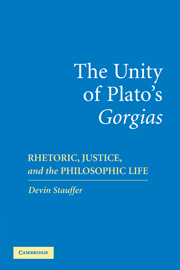Book contents
3 - The Confrontation between Socrates and Callicles
Published online by Cambridge University Press: 30 July 2009
Summary
Gorgias must be impressed by Socrates' success in at least taming Polus and by what Socrates has shown about Polus' concerns. Yet doubts might reasonably linger about whether Socrates' success with Polus, even as limited as it is, could be duplicated with a more demanding interlocutor. And Gorgias also might wonder whether the attachment to justice that Socrates has revealed in Polus is really a sign of a deep concern in the human soul rather than a reflection of Polus' susceptibility to bouts of shame. If these are Gorgias' thoughts at this stage of the dialogue, he will welcome the entry of Callicles. As soon as Callicles enters the conversation, the tone becomes more serious and demanding. This change can be felt from the moment Callicles speaks up to ask whether Socrates is really being serious in defending the position he has been defending, and then exclaims: “For if you are being serious and these things that you are saying are really true, wouldn't that mean that our lives as human beings are now turnedupside down, and that everything we do is the opposite of what we should do?” (481c1–4). Unlike Polus, who displayed a willingness half-heartedly to follow arguments wherever they might lead, Callicles has a much sharper sense of the gravity of the conclusions of Socrates' arguments. In this respect at least, he first comes to sight as the most impressive of Socrates' interlocutors.
- Type
- Chapter
- Information
- The Unity of Plato's 'Gorgias'Rhetoric, Justice, and the Philosophic Life, pp. 82 - 122Publisher: Cambridge University PressPrint publication year: 2006



